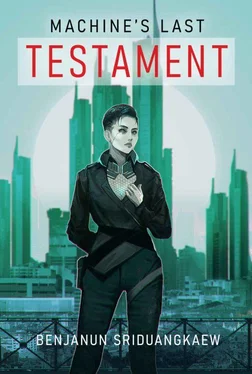“Not from volunteering. I do not have your courage.”
Etris mimes amusement. “How well do you know this place?”
Hedging for a measure of what Ovuha might be able to do for her. Etris is friendly for a reason. “You could say I’m a repeat guest.”
“The games—”
“The wardens have their entertainment, yes.” Like dogfighting, but with inmates.
A sharp breath out. Her mood is written boldly, like calligraphy, on the rhythm of her respiration. “I’ve been trying to enter. Do they keep their…”
Ovuha takes in the rest of Etris. She has not changed since Ovuha last saw her in the Jasmine. Pallid, like Rachel, dun hair and ditchwater eyes. Fragile. “It’s how I got out as quickly as I did the first time. So yes. They do keep their promise and grant you the recommendations.” Presumably if Etris earns her exit to the Bureau offices or Penumbra, her children will keep their extra funds. Some legalistic convolution. “But it’s down to their caprices. This isn’t a system, or not a fair one. Have you had any physical training?”
“How do I get in?”
“I don’t recommend it.”
Etris stares at her. “I’ll be the judge of that. I have to—” Her hand clenches around a fistful of smock. “Just tell me.”
She could walk away. “Pick a fight and win it. Or win when someone starts it with you. Whatever shows that you can give good sport.”
Ovuha spends the evening mapping the detention center, reacclimating. The other contested territory is the bathrooms, but she’s clean for the time being. As she thought, the layout has changed. A reshuffling of modular corridors, a reassigning of rooms and sections. What is now the cafeteria used to be for exercise—how the drones must have toiled to clean the blood—and the infirmary is not where she expected it to be. This is done ostensibly to ease ennui, but it merely disorients and makes escape that much harder. Not that it’s a wise course of action in any case. Trackers, once inserted, never turn off. She has broken the habit of touching her shoulder where the tracker lives. It’s become unnoticeable, as though it’s been a part of her from the beginning. The mindset of a broken animal: bondage is assimilated as a natural condition.
The layout is not ideal, but neither is the location of the camp itself. She has not been found guilty yet, on charges of subversion or otherwise, else she’d have been put under greater security. That gives her some room. First she will have to win herself certain privileges, take stock of the current wardens.
They come for her in the night, the dormitory unlocking without ceremony. The light comes on. The others pretend to remain asleep, faces turned to the walls as Ovuha is shaken awake. She lets the officer yank her to her feet—she slept lightly, in anticipation of this.
Out, into the dark corridor. She longs suddenly for a window, even an illusion of night, day, sky. The sun and wind on her skin, the sound of the sea. Those sensations diminish so quickly, much like the taste of good food, wine, comforts that are not even a week out of sight.
They leave her in an office that looks like any other, the accoutrements of mundane bureaucracy. A standard-issue desk, this wide, this long. Chairs that are neither comfortable nor uncomfortable. Devoid of personal effects, save for a decorative haze of white particulate feathers and disembodied dragonfly wings. They’re a new addition; she wonders who advised him on it.
Director Ehtesham has his back to her, hands clasped, an affected pose. “Sit, sit,” he says. “Hinata is so upset. You shouldn’t trample on people’s goodwill like that.”
He is not fit or armed, that has not changed either. No drones guard the office, not this side of the door. She can end him with her bare hands and it would take less than thirty seconds: she’d be able to do it silently, before he can cry out. “I do hate to disappoint, officer. It wasn’t my plan to return.”
A rustle of shorn, luminescent wings. Ehtesham turns around, pushing his spectacles—another affectation—up the bridge of his nose. “Well, you’re back, not much anybody can do about that. We might as well make the best of it.”
The tone, the actual words, as though Ehtesham has nothing to do with this process. As though the entry of a person into detainment is a force of nature that he, like his colleagues, is helpless to avert or resist. They all speak like this, except Suzhen. “Yes, officer? What would you suggest?”
“Well.” His speech tic, like punctuation. “The weekly games have been rather dull after you left.”
The way he puts on this air of a kindly counselor—which he doubles as, on occasion—offering gentle advice for her own good. Strange, Ovuha thinks, that she has been at the mercy of innumerable officers, all of them sadists. But it is Director Ehtesham whose entrails she most yearns to see lying on the floor, wet and glistening. The most anyone could say for Ehtesham is that his interest in subjugated bodies stops at violent spectacle and does not extend to sexual humiliation. “I’m happy to contribute. It’s the least I can do, after the kindness I’ve been shown here.” She keeps her voice free of rancor. She knows how to sound earnest when she has to. “Can I expect some little things to let me participate better?”
“Certainly! We want you in prime condition. We want everyone in prime condition,” he adds, looking rueful. “Educated, healthy, and ready when they leave us. But some strive to be those things better than others, don’t you agree? Others don’t strive at all.”
Grotesque. “Not all of us are made equal.” Say things that are trite and agreeable. For now she’s secured for herself better nutrition, time slots for exercise and showers, fresher laundry if Ehtesham is feeling generous. “When do I start?”
Routine is its own refuge; Suzhen goes through hers. It is not as if she hasn’t lost a potentiate before. A handful she approved did not pass their probation, got reabsorbed into the system. That is natural, it is impossible for every single candidate to make the grade. The grade of being considered human.
She can take a few days off, if she likes. Nattharat is munificent. Not much work at the present, in any case, just maintaining and following up on active cases. New refugee intake has paused entirely. Most pending candidates have been transferred to orbital facilities until further notice.
Incarceration is finite, a sentence with predictable duration. Detention is waiting upon waiting: clever negotiation may earn faster exit, but there is no institutional goal—asylum seekers are not citizens to be rehabilitated, they are refuse that must be scourged and molded into people-shapes. And now even clever negotiation or a tie to someone like Bhanu cannot guarantee anything.
Until further notice, like a minor renovation, a shift in office floor plans. This boardroom is unavailable until further notice. That cafeteria is closed until further notice. These people are non-human until further notice.
Suzhen leaves work early. She feels massless, unmoored from tendons and muscles, from the alimentary processes that churn behind her skin. Her guidance informs her that her calibration is scheduled for next week. She used to both welcome and fear it, believing this both an intrusion and benediction, that the sessions would erase the fragile and hungry parts; that they would leave her purified and free from worry but not quite herself. The reality is more mundane. Surface modification performed through cognitive modifying while she is under trance, done to fit her easier into polite society than to do anything for her personal contentment. Nor does it last. “Fine,” she says quietly, not that other options exist. This calibration is mandatory, her stress index and social metrics having crossed a threshold. Or whatever else. She tries not to think of guilt, of criminal stains.
Читать дальше












